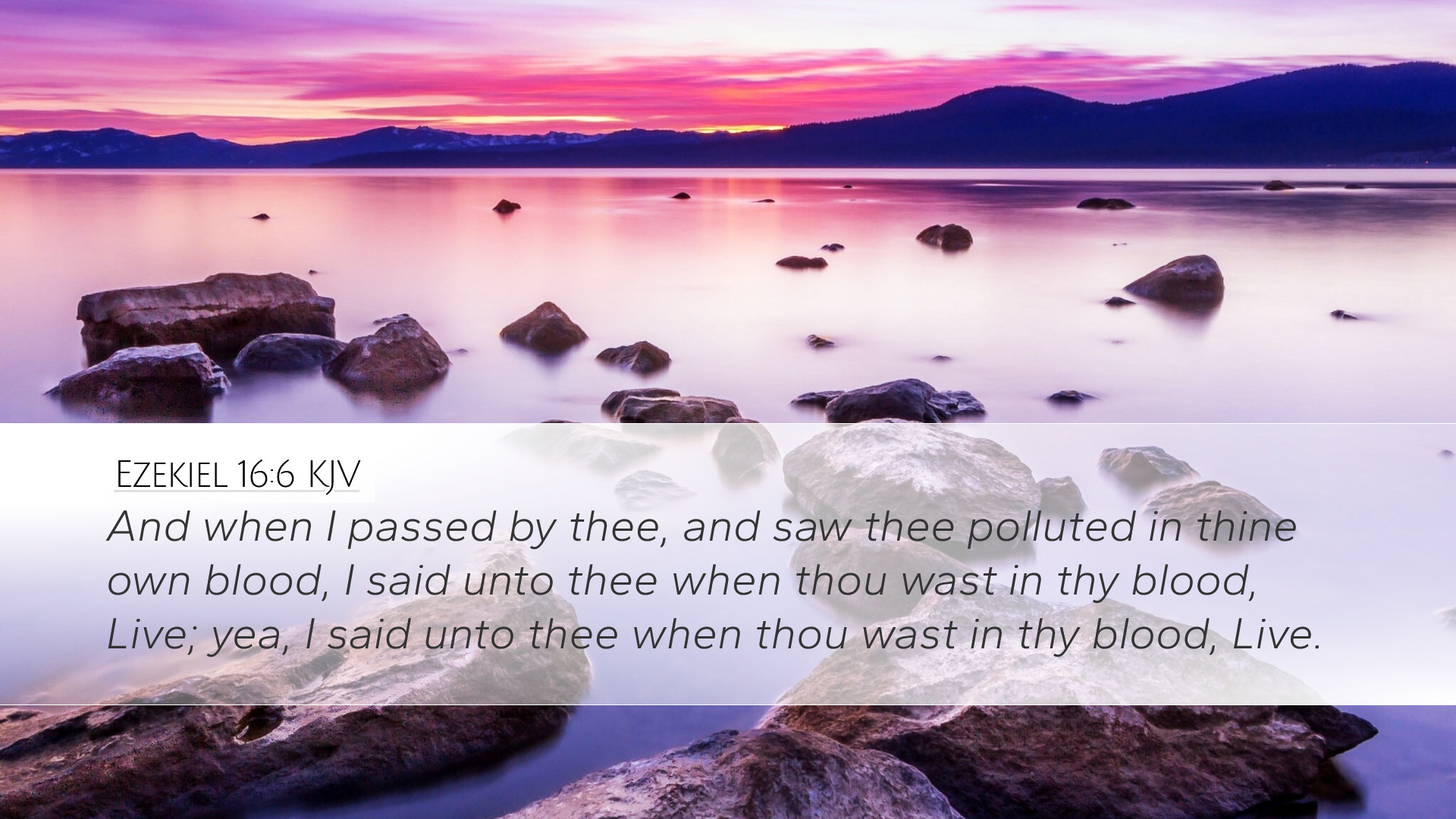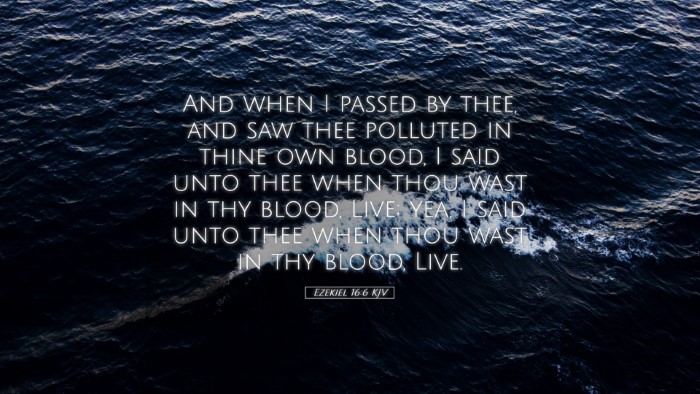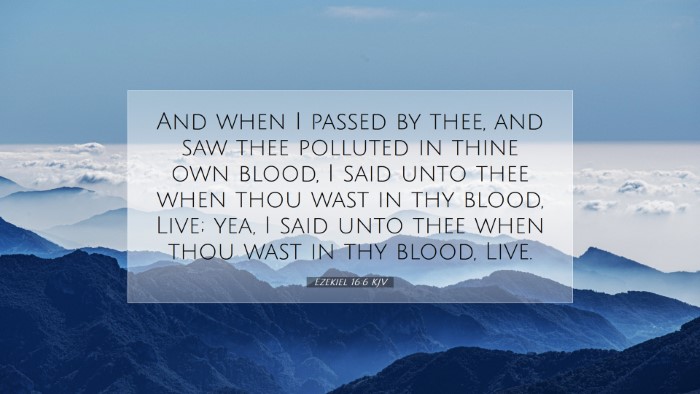Bible Commentary on Ezekiel 16:6
Ezekiel 16:6 reads: "And when I passed by thee, and saw thee polluted in thine own blood, I said unto thee, When thou wast in thy blood, Live; yea, I said unto thee, When thou wast in thy blood, Live." This verse encapsulates a powerful moment of divine grace, illustrating God's relentless love and mercy toward His people, even in their most desperate state.
Contextual Background
The Book of Ezekiel serves as both a prophetic warning and a reminder of God's covenant relationship with Israel. In Ezekiel 16, the prophet uses vivid imagery to depict Jerusalem as an unfaithful wife, highlighting the degradation of the people in sin. This chapter illustrates God's faithfulness amidst Israel's unfaithfulness and serves as a foundation for understanding His covenant love.
Insights from Matthew Henry
Matthew Henry reflects deeply on the nature of God's grace manifested in this verse. He emphasizes that God’s act of passing by and seeing the polluted condition of Israel is a representation of His omnipresence and awareness of our plight. Henry notes:
- The Conditional Nature of Grace: God's call to 'Live' occurs when the people were utterly helpless and marred by sin. It illustrates the unmerited favor that God gives to those who do not deserve it.
- Divine Intervention: Henry points out that God's intervention is not only loving but also transformative. The command to live (Chai) brings forth the idea of spiritual regeneration, as God breathes life into a situation of death.
- The Symbolism of Blood: The mention of blood symbolizes both the life of the people and their sinfulness. God does not shy away from acknowledging the grim reality but rather addresses it, bringing hope where there seems to be none.
Insights from Albert Barnes
Albert Barnes extends the commentary with a focus on the theological implications of God’s declaration to live:
- The Character of God: Barnes emphasizes that this verse showcases God’s desire for redemption rather than destruction. It marks a significant theological principle that divine judgment is tempered by divine mercy.
- The Nature of Humanity: He reflects on the impure state of Israel's blood, which could be seen as a metaphor for their sinfulness and desperate need for salvation. Barnes points out that in our natural state, we are akin to that polluted blood, in need of God's life-giving power.
- Hope in Despair: For Barnes, the message of hope embedded in God's command to "live" serves to remind us of the ever-present opportunity for repentance and grace. It underscores the transformative power of the Word of God in the lives of His people.
Insights from Adam Clarke
Adam Clarke's commentary adds layers of linguistic and cultural depth to our understanding of this verse. He explains:
- Linguistic Analysis: Clarke analyzes the original Hebrew terms, emphasizing the richness of the words used for "polluted" and "blood." He suggests that the repetition of "live" underscores the urgency and intensity of God’s command.
- Historical Context: Clarke provides insights into Israel's historical context, noting their idolatry and rebellion against God that led to their dire circumstances. He stresses that God’s call to life comes despite their history of turning away from Him.
- Theological Significance of Life: Clarke also points to the broader theological themes of life throughout Scripture, reinforcing that God’s intent for humanity is wholeness and vitality, not death and decay. The call to 'live' here is a pivotal moment, a divine invitation to spiritually awaken and respond to His grace.
The Importance of This Verse for Pastoral Care and Theology
This verse has profound implications for pastoral care and theological reflection. It serves as a reminder of several key principles:
- The Nature of God’s Call: Just as God called Israel to live, so too does He call every person to experience His life-giving grace. This serves as a fundamental truth for evangelism and ministry.
- The Reality of Human Sinfulness: Understanding the polluted state of the blood is crucial for recognizing the depth of our need for redemption. Pastoral ministry must engage with the reality of sin while holding out the hope of salvation.
- Hope and Restoration: This passage provides a basis for preaching hope. No one is beyond the reach of God's grace, and every situation, no matter how dire, can be transformed by God’s powerful command to "live."
Conclusion
The layered meanings and insights from Ezekiel 16:6 underscore the depth of God’s love and the hope He offers. Through the voices of committed biblical scholars like Matthew Henry, Albert Barnes, and Adam Clarke, we are invited to reflect on the overarching themes of grace, sin, and restoration. This passage calls not only for personal reflection but also urges the church to preach a message of hope to a world mired in sin, announcing that God is waiting to breathe life into the spiritually dead. For pastors, students, and theologians alike, Ezekiel 16:6 exemplifies the heart of the gospel: that our God is a God who brings life amidst death.


